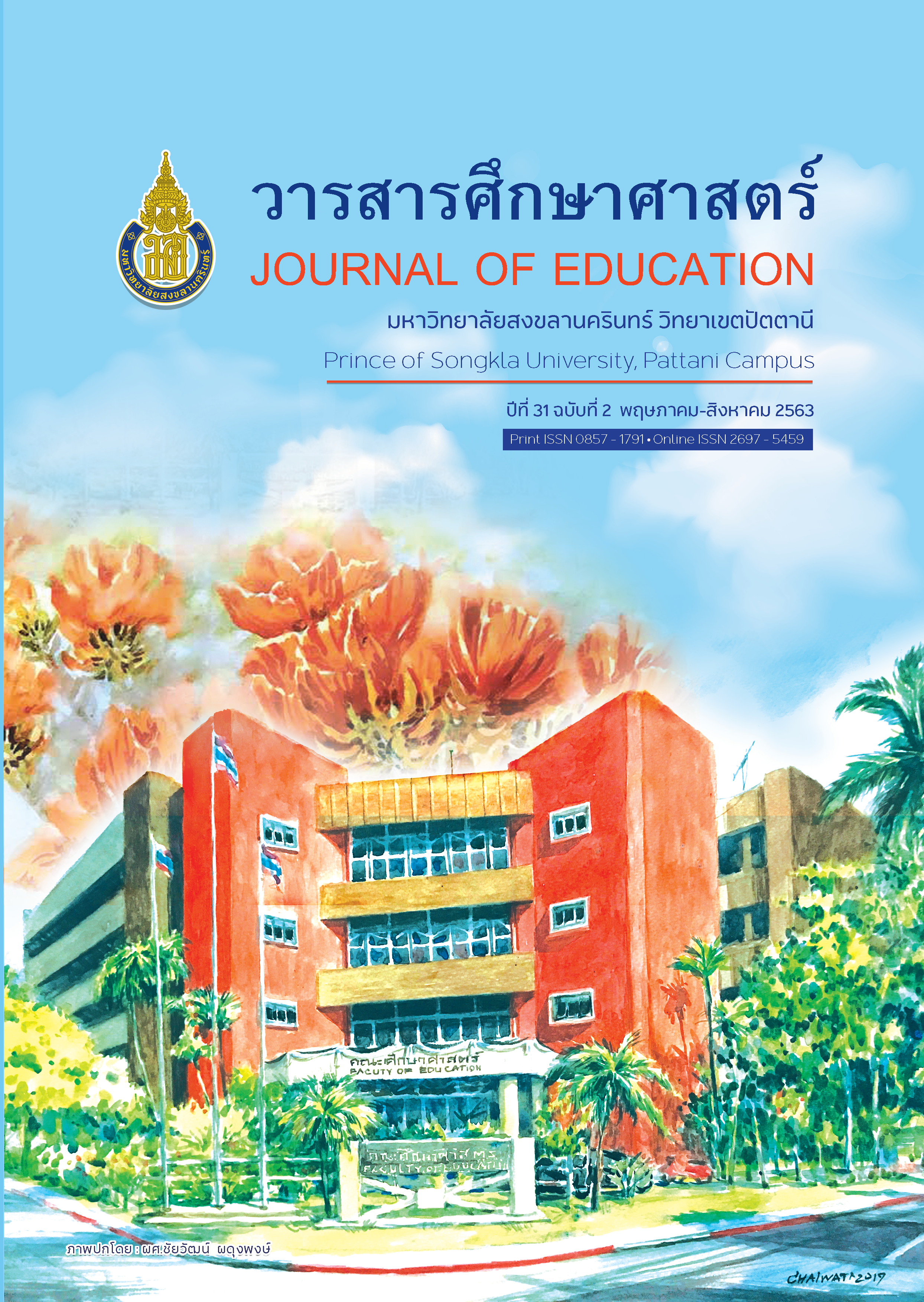การบูรณาการกระบวนการสอนแบบโครงงาน เพื่อพัฒนาทักษะการพูดภาษาอังกฤษของนักศึกษาสาขาวิชาพลศึกษา สถาบันการพลศึกษา วิทยาเขตยะลา
Main Article Content
บทคัดย่อ
การวิจัยครั้งนี้มีวัตถุประสงค์เพื่อ 1) เปรียบเทียบทักษะการพูดภาษาอังกฤษของนักศึกษาที่เรียนด้วยกระบวนการสอนแบบโครงงาน (project based learning) และวิธีการสอนแบบปกติ 2) เปรียบเทียบทักษะการพูดภาษาอังกฤษของนักศึกษาก่อนและหลังเรียนด้วยกระบวนการสอนแบบโครงงาน และ 3) เปรียบเทียบทักษะการพูดภาษาอังกฤษของนักศึกษาหลังเรียนด้วยกระบวนการสอนแบบโครงงานกับเกณฑ์ร้อยละ 65 การวิจัยนี้เป็นการศึกษาเชิงทดลองโดยบูรณาการกระบวนการสอนแบบโครงงาน ซึ่งประกอบด้วย 5 ขั้นตอน คือ การเรียนรู้ การวางแผน การลงมือทำ การนำเสนอ และการทบทวน กลุ่มตัวอย่างที่ใช้ในการวิจัยเป็นนักศึกษาระดับปริญญาตรี สถาบันการพลศึกษา วิทยาเขตยะลา ตามหลักสูตรศึกษาศาสตรบัณฑิต ที่ลงทะเบียนเรียนรายวิชา มศ 052048 ภาษาอังกฤษเพื่อการสื่อสารเชิงวิชาการสำหรับวิชาชีพพลศึกษา จัดการเรียนการสอนภาคปลายปีการศึกษา 2561 การวิจัยใช้เทคนิคการสุ่มแบบเจาะจง (purposive sampling technique) จากนักศึกษาสาขาวิชาพลศึกษา จำนวน 2 กลุ่มเรียน จำแนกเป็นกลุ่มทดลอง จำนวน 23 คน และกลุ่มควบคุม จำนวน 19 คน รวม 42 คน ซึ่งผู้วิจัยได้ทำการทดสอบก่อนเรียนเพื่อวัดความสามารถด้านการพูดภาษาอังกฤษ ผลการทดสอบพบว่า ต่ำกว่าเกณฑ์ร้อยละ 50 และทั้ง 2 กลุ่มเรียนมีค่าเฉลี่ยคะแนนไม่แตกต่างกัน งานวิจัยนี้ใช้ระยะเวลาในการทดลองจำนวน 45 ชั่วโมง เครื่องมือที่ใช้ในการวิจัย ประกอบด้วย แผนการสอนโดยใช้กระบวนการสอนแบบโครงงาน แผนการสอนแบบปกติ และแบบประเมินทักษะการพูดภาษาอังกฤษ สถิติที่ใช้ในการวิเคราะห์ข้อมูล ได้แก่ ค่าเฉลี่ย () ส่วนเบี่ยงเบนมาตรฐาน (s.d.) และสถิติทดสอบ (t-test) ผลการวิจัยพบว่า ทักษะการพูดภาษาอังกฤษของนักศึกษาที่เรียนด้วยกระบวนการสอนแบบโครงงานสูงกว่านักศึกษาที่เรียนด้วยวิธีการสอนแบบปกติอย่างมีนัยสำคัญทางสถิติที่ระดับ .01 ทักษะการพูดภาษาอังกฤษของนักศึกษาหลังเรียนด้วยกระบวนการสอนแบบโครงงานสูงกว่าก่อนเรียนอย่างมีนัยสำคัญทางสถิติที่ระดับ .05 และสูงกว่าเกณฑ์ร้อยละ 65 ซึ่งทำให้ทักษะการพูดและการสื่อสารด้วยภาษาอังกฤษของนักศึกษาดีขึ้น ซึ่งทักษะเหล่านี้ล้วนมีความสำคัญและจำเป็นในการเตรียมความพร้อมเพื่อฝึกประสบการณ์วิชาชีพหรือการดำเนินชีวิตในอนาคต
Article Details
เอกสารอ้างอิง
Bender, W. N. (2012). Project-Based Learning : Differentiating Instruction for the 21st Century. California: CORWIN A SAGE Company
Chantakut, J. (2014). Importance of English. https://sites.google.com/site/krujitpisut/khwam-sakhay-khxngphasa-xangkvs
Chalarak, N. (2015). The role of teachers and teaching in the 21st century. The Teacher's Role and Instruction in The 21st Century. Journal of the Far Eastern University, 9(1).
Dejakup, P. (2013). Teaching Thinking through Integrated Teaching and Learning Project Century skills 21. 3rd edition. Bangkok: Chulalongkorn University Printing House.
Domesrifa, K. (2008). A study of the use of speaking activities for communication in the development of English speaking ability of mathayom suksa 1 students. Department of Teaching English as a Foreign Language Srinakharinwirot University.
Jaikasa, N. (2012). Development of speaking ability on various occasions using role-based teaching. Hypothetical speaking art of vocational certificate students National Academic Conference Nakhon Pathom Rajabhat University.
Lardizabal, Amparo S. and others. (1970). Methods and Principles of Teaching. Quezon City: A Lemer – Phoenix.
McDonnell, K. (2007). Can 40 seconds of compassion reduce patient anxiety. Journal of Clinical Oncology, 17(1), 371.
Naisbitt, John. (2014). Megatrends: Ten new directions transforming our lives. Warner Books/ Warner Communications Company.
Newman, J. L. (2008). Talents are unlimited: It’s time to teach thinking skills again. Summer 2008. 31(3), 34 – 44.
Ornstein and Hunkins. (1988). Curriculum: Foundation, Principles and Issue 2th. Boston: Allyn and Bacon, 1993.
Oleg, T. & Mohamed K. (2016). Adaptive Knowledge Management of Project-based Learning. Journal of Education and Training Studies, 4(6),137–144.
Panich, V. (2012). Learning management in the 21st century. Teaching in the 21st century. Bangkok.
Plailek, T. (2011). The development of English final consonant skills of students Grade 6. The Demonstration School of Suan Sunandha Rajabhat University Bangkok: Rajabhat University Suan Sunandha.
Phan, L.H. (2013). The English language in the ‘Asian century’: University World News Publication.
Randall, C. M. (1987). Job Satisfaction of Chief Administrative Officers of Teacher Education Programs. Dissertation Abstracts International. 48(1) : 21-A.
Simpson, M. R. (2011). Engagement at Work: A Review of the Literature. International Journal of Nursing Studies. 46, 1012-1024.
Sombatyanuchit.A. (2009). The use of local content in cooperative learning to promote competency Speaking and reading English in advanced students. Master's thesis Chiang Mai University.
Songkram.N. (2011). Development of project-based learning model and collaborative learning for knowledge building Is an innovation for students Bachelor of Education in Public Higher Education Institutions Project research report Create innovative knowledge for students. Valaya Alongkorn Rajabhat University under the Royal Patronage.
Strobel J, Barneveld AV. (2009). When is PBL more effective? A meta-synthesis of meta-analyses comparing PBL to conventional classrooms. IJPBL 2009, 3,44-58.
Yohlao.D. (2014). A Study of PBL Learning Management from the Knowledge Construction Project for Building 21st Century Skills for Children and Youth: Based on the school's successful experience. Thailand. Bangkok: Thippayawut Ltd., Part.
Zohreh Eslamin and Randall Garver. (2013). English Language learning and project Based - learning. https://brill.com/view/book/edcoll/9789462091436/BP000014.xml#paywall- content Yiyin


